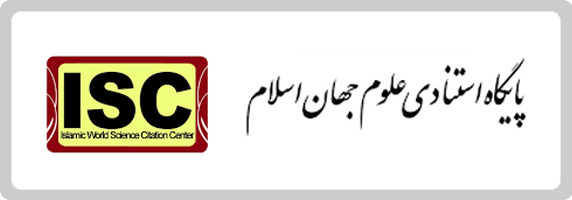تاثیر راهبردهای مقابله ای بر کمال گرایی با نقش میانجی انگیزه پیشرفت در دانشجویان
کلمات کلیدی:
راهبردهای مقابله ای, کمال گرایی , خودکارآمدی تحصیلی , دانشجویان , نکاچکیده
هدف پژوهش حاضر، بررسی تاثیر راهبردهای مقابلهای بر کمال گرایی با نقش میانجی انگیزه پیشرفت در دانشجویان دانشگاه آزاد اسلامی واحد نکا بوده است. روش این پژوهش از نظر هدف کاربردی از از نظر روش توصیفی و از نوع همبستگی مبتنی برمدل یابی معادلات ساختاری است. جامعه آماری آن را، کلیه دانشجویان دانشگاه آزاد اسلامی واحد نکا که 1812 نفر که به روش تصادفی- طبقهای بر حسب جنسیت تعداد 317 نفر انتخاب شدند. جهت جمع آوری دادهها از پرسشنامههای استاندارد42سوالی راهبردهای مقابلهای روزنشتایل و کیف، 29سوالی انگیزه پیشرفت هرمنس و 58سوالی کمال گرایی هیل و همكاران استفاده شد. پایایی با استفاده از ضریب آلفای کرونباخ برای پرسشنامههای راهبردهای مقابلهای 93/0، انگیزه پیشرفت 88/0 و کمال گرایی 96/0 دست آمده که از لحاظ آماری معنادار بود. جهت تجزیهوتحلیل دادهها از معادلات ساختاری(SEM) با رویکرد حداقل مربعات جزئی (PLS) از طریق نرم افزار Smart PLS استفاده شد. راهبردهای مقابلهای بر کمال گرایی در دانشجویان تاثیر دارد.راهبردهای مقابلهای بر انگیزه پیشرفت در دانشجویان تاثیر دارد. انگیزه پیشرفت بر کمال گرایی در دانشجویان تاثیر دارد. علاوه بر این، متغیر انگیزه پیشرفت در رابطه با تاثیر راهبردهای مقابلهای بر کمال گرایی در دانشجویان نقش میانجی دارد. نتیجه گرفته میشود که دانشجویانی که راهبردهای مقابلهای و انگیزه پیشرفت بالاتری دارند، کمال گرایی بهتری داشته و راهبردهای یادگیری سودمندتری را بکار برده و در نهایت، کارکرد بهتری خواهند داشت
دانلودها
مراجع
Balochi, H. (2020). The Power of Emotional Intelligence. Sobhe Sadegh Publications. https://books.google.com/books?
Bartholomew, K. J. (2021). Self-determination theory and diminished functioning: the role of interpersonal control and psychological need thwarting. Personality and Social Psychology Bulletin, 37(1), 1437-1459. https://doi.org/10.1177/0146167211413125
Brakamonte, N. M., Kitaeva, E., Brakamonte, D. M., & Chubun, I. (2024). Motivation for Success: Perfectionism and Procrastination in Adults Learning at Professional Training Programs Case (In English). Vestnik of Saint Petersburg University Psychology, 14(4), 731-742. https://doi.org/10.21638/spbu16.2024.410
Bychap, K. (2022). Examining the role of perfectionism, the motivation to progress in the academic progress of students. Contemporary Educational Psychology, 34(4), 109-129. https://psycnet.apa.org/record/2014-05061-001
Chasetareh, F., Barabadi, E., Khajavy, G. H., & Flett, G. L. (2022). Perfectionism and L2 Achievement: The Mediating Roles of Motivation and Self-Regulated Learning Among Iranian High School Students. Journal of Psychoeducational Assessment, 41(1), 3-21. https://doi.org/10.1177/07342829221096916
Choi, H.-j., Cho, S., Kim, J., Kim, E. J., Chung, J., & Lee, S. M. (2022). The Mediating Effect of Introjected Motivation on the Relation Between Perfectionism and Academic Burnout. Journal of Psychologists and Counsellors in Schools, 32(2), 207-219. https://doi.org/10.1017/jgc.2020.8
Hojjatimoghaddam, S. M. (2020). The relationship between personality traits and perfectionism with academic procrastination. Fourth National Conference on Psychology, Payame Noor University, https://www.sciencedirect.com
Kharazi, A., Ejhei, J., Ghazi Tabatabaei, M., & Karshaki, H. (2019). Examining the relationship between achievement goals, self-efficacy, and metacognitive strategies: Testing a causal model. Journal of Psychology and Educational Sciences, 38(3), 69-87. https://www.academia.edu
Koln, E. (2019). Examining the role of coping strategies on students' progress motivation. Behavior Research and Therapy, 40(30), 773-391. https://www.academia.edu
Lundqvist, C., Kolbeinsson, Ö., Asratian, A., & Wade, T. (2024). Untangling the Relationships Between Age, Gender, Type of Sport, Perfectionistic Self-Presentation and Motivation on Body Satisfaction: A Cross-Sectional Study on Aesthetic and Non-Aesthetic Female and Male Athletes Aged 10 to 22 Years. BMJ Open Sport & Exercise Medicine, 10(3), e001975. https://doi.org/10.1136/bmjsem-2024-001975
Mortag, M., & Valiante, G. (2019). Examining the relationship between perfectionism and academic self-efficacy with students' motivation to progress. Psychological Inquiry, 11(1), 227-268. http://www.jallr.com/index.php/JALLR/article/view/214
Nateghian, A., Bagherzadeh Golmakan, Z., Nejat, H., & Sameri, A. A. (2023). Developing a predictive model of academic procrastination based on social self-efficacy and perfectionism: The mediating role of achievement emotions. Quarterly Journal of Psychological Sciences, 21(112), 835-845. https://doi.org/10.52547/JPS.21.112.835
Noor, B. (2023). Pressure and perfectionism: a phenomenological study on parents’ and teachers’ perceptions of the challenges faced by gifted and talented students in self-contained classes [Brief Research Report]. Frontiers in Education, 8. https://doi.org/10.3389/feduc.2023.1225623
Rasouli, S., Ahmadian, H., Jadidi, H., & Akbari, M. (2022). The relationship between self-regulation strategies and achievement motivation with academic engagement: The mediating role of self-handicapping and perfectionism. Bi-Monthly Scientific-Research Journal of Educational Strategies in Medical Sciences, 4(15), 376-388. https://edcbmj.ir/article-1-2182-fa.pdf
Smith, L. (2023). Examining the relationship between coping strategies and perfectionism in college students. Rev Psychol, 53(2), 32-109. https://pdfs.semanticscholar.org/
Soleimani, M., & Mohammadzadeh, H. (2022). Examining the relationship between perfectionism, psychological distress, and coping strategies. Journal of Mind, Movement and Behavior, 3(1), 171-184. https://psycnet.apa.org/fulltext/2003-05899-012.html
Ståhlberg, J., Tuominen, H., Pulkka, A.-T., & Niemivirta, M. (2021). Students' perfectionistic profiles: Stability, change, and associations with achievement goal orientations. Psychology in the Schools, 58(1), 162-184. https://doi.org/10.1002/pits.22444
Turner, A. D. (2021). Examining the relationship between students' progress motivation and perfectionism. Journal of Educational Psychology, 82(12), 33-40. https://psycnet.apa.org/record/2014-05061-001
دانلود
چاپ شده
ارسال
بازنگری
پذیرش
شماره
نوع مقاله
مجوز
حق نشر 2025 فاطمه صغری سینا (نویسنده مسئول); قدسیه جمشیدی کوهساری (نویسنده)

این پروژه تحت مجوز بین المللی Creative Commons Attribution-NonCommercial 4.0 می باشد.






